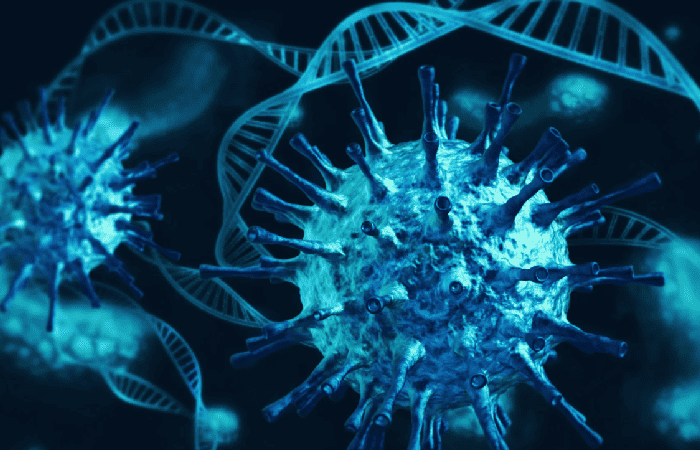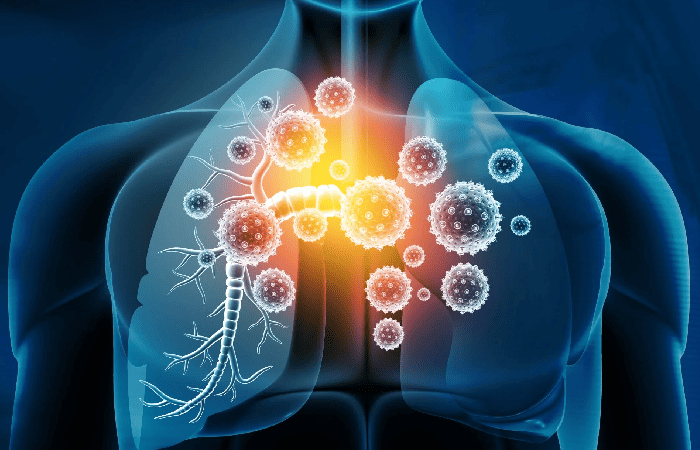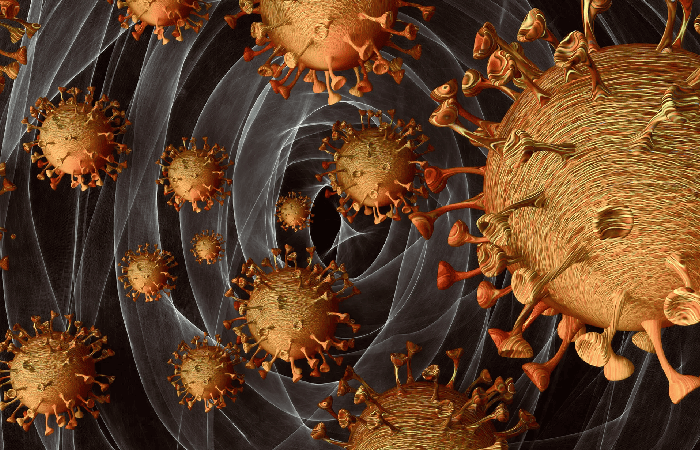Discover Long Covid And Understand How SARS-CoV-2 Tricks With Your Pain
Uncover the mysteries of Long Covid and unravel the intricate ways in which SARS-CoV-2 manipulates and deceives your body, causing prolonged pain.

Long COVID, often referred to as post-acute sequelae of SARS-CoV-2 infection (PASC), is a syndrome where individuals continue to experience persistent or new symptoms for weeks or months after the acute phase of COVID-19, long after the virus has left their body.
Even while the majority of COVID-19 patients recover within a few weeks, a tiny proportion of persons continue to have a variety of symptoms that can significantly impede their day-to-day activities.
Coronavirus 2 AND Long Covid
A coronavirus known as Severe Acute Respiratory Syndrome Coronavirus-2 (SARS-CoV-2) is the culprit behind this illness. It mostly shows up in the lungs and other parts of the respiratory system.
Numerous tissues express the angiotensin-converting enzyme-2 (ACE-2) and the virus enters the cell by attaching to ACE-2 with its spike-like surface projections.
A large fraction of symptomatic people eventually develops catastrophic lung damage and acute respiratory distress syndrome (ARDS), which sharply raises morbidity and mortality despite the fact that the majority of them merely show mild flu-like symptoms.
Patients over sixty who have a history of cardiovascular issues are more susceptible to severe clinical symptoms.
Long COVID is a post-acute sequelae of SARS-CoV-2 infection (PASC), is a syndrome in which people continue to have ongoing symptoms for almost weeks or months after suffering from COVID-19.
Even after the virus has left their bodies. While the majority of the patients recover after a few weeks, some continue to struggle with a variety of symptoms that interfere with their day-to-day activities.

About Coronavirus
-
Coronaviruses are a sizable and diverse category of enclosed viruses. The positive-sense single-stranded RNA found in coronaviruses serves as their genetic material.
-
Numerous respiratory conditions, including the common cold, are brought on by these viruses in both humans and other mammals.
-
The name coronavirus derives from the appearance of a crown created by the club-shaped protein spikes on the coronavirus envelope when observed under transmission electron microscopy.
-
Both the Severe Acute Respiratory Syndrome-CoV-1 (SARS-CoV-1) and the Middle East Respiratory Syndrome-Related Coronavirus (MERS-CoV), which is the MERS-cause, are examples of these.
-
The virus has a diameter of 120 nm. Significant respiratory infections have also been induced by other coronavirus family members.
Investigations
Despite possessing the ability to infect any tissue with ACE-2 receptors, including the gastrointestinal tract, the cardiovascular system, and other tissues, SARS-CoV-2 is primarily respiratory tissue specific.
The early infection limits the virus to respiratory tissues; therefore, up to this point, studies have focused on separating the viral nucleic acid from samples of saliva, sputum, nasopharyngeal discharge, and lower respiratory tract.
Of note, the virus often persists in the feces for a long time, even after treatment and cure.

What is Long Covid?
When COVID-19 symptoms persist for several weeks or months after the original illness, even if the virus is no longer active in the body, this condition is known as protracted COVID.
-
The majority of those who get the coronavirus recover within a few weeks, but some continue to struggle with exhaustion, breathing concerns including shortness of breath, and psychological disorders like depression, anxiety, difficulty sleeping, and "brain fog."
-
Your ability to manage your finances, make decisions, organize your time, go to work, or attend school may be hampered by the symptoms, also known as post-COVID-19 syndrome, long-tail COVID, or long-haul COVID.
-
Even simple physical tasks like driving, housework, or making a phone call might make you feel worn out and sore. You can experience unexpected forgetfulness, have trouble focusing on straightforward chores, or feel as though you can't think clearly.
-
Some persons with lengthy COVID have a clouded or foggy mental state that makes it challenging to perform tasks like math computations or choose the appropriate words to express themselves.
-
Being a "long hauler" can also cause mental problems, with the most prevalent manifestations being signs of anxiety, depression, or post-traumatic stress disorder.

Unmasking Long Covid
Researchers from Boston University, the Icahn School of Medicine at Mount Sinai, and New York University found that SARS-CoV-2 infection can cause the dorsal root ganglia to sustain long-lasting damage, which can manifest as Post-COVID Conditions or Long COVID symptoms.
-
The research revealed that even after the viral infection had been treated, hundreds of genes linked to neurodegeneration and pain-related pathways remained altered.
-
In an experimental mouse infected with SARS-CoV-2, the researchers noticed a gradual rise in sensory sensitivity over time, underscoring the virus's distinct ability to produce long-lasting discomfort.
-
According to several studies, a significant part of Long COVID patients experience anomalous sensations of pressure, warmth, discomfort, or tingling throughout their bodies.
-
Our research reveals that SARS-CoV-2 may cause long-lasting discomfort in a somewhat unusual manner, highlighting the requirement for therapies that target the virus' particular molecular pathways.
-
The researchers investigated the impact of infection on touch sensitivity both during active infection and well after the virus had cleared using an animal model infected with SARS-CoV-2.
-
The consequences of SARS-CoV-2 were then contrasted with those of an influenza A virus infection. They noticed a gradual but steady rise in sensory sensitivity in the experimental model over time, which was quite different from the viral control, influenza A virus, which occurred.
-
The researchers claim that this model may be utilized to learn more about the genes and pathways impacted by SARS-CoV-2, offering the scientific community new knowledge about changes in gene expression in sensory ganglia several weeks after infection.
New research findings may assist verify potential therapeutics for the prevention and treatment of COVID-19 and contribute to our understanding of pathogenesis.
According to a study by researchers from various institutions, SARS-CoV-2 infection can result in long-lasting damage to sensory nerves, resulting in symptoms of Long COVID.
-
The necessity for targeted therapies was highlighted by the study's identification of gene expression variations linked to pain- and neurodegeneration-related pathways. The discoveries suggest future possibilities for resolving somatosensory problems and creating new medications.
-
The condition caused by the SARS-CoV-2 infection, COVID-19, has a wide range of clinical outcomes, from asymptomatic illness to death. COVID-19 can cause respiratory infection symptoms (cough, congestion, fever) and sensory abnormalities, such as headache and loss of smell, in people with milder illnesses.
-
In more severe cases, SARS-CoV-2 infection can harm nearly every organ and cause rapid renal failure, cardiovascular damage, and strokes from arterial occlusion.
-
Numerous individuals with current infections, both moderate and severe, report sensory-related symptoms such as headache, abdominal pain, Guillain-Barre syndrome, nerve pain, and inflammation.
-
In most individuals, these symptoms go away once the infection is gone, although they might linger in certain patients.
What to do if You have long covid?
It's critical to adjust your coping mechanisms to your unique symptoms because lengthy COVID symptoms and their effects can differ greatly from patient to patient.
Physical ailments like shortness of breath, fever, and discomfort can deplete your vitality, cause mental exhaustion, and cause a sad mood, all of which call for different coping mechanisms.
There are steps you can take to care for your general health and lessen your distress during this trying period, despite the fact that it can feel overwhelming.
If you feel chest pain, difficulty breathing, a significant change in weight, or are unable to stay awake, eat, or drink, seek medical attention right once. Additionally, your doctor may be able to assist with physical symptom relief and significant medical conditions.
Get your shots: While the study is underway, some long-haul drivers claim that receiving the COVID-19 vaccine has helped them feel better.
Continue being cautious to prevent reinfection: Avoid travel unless it is absolutely necessary, often wash your hands with soap and water, cover your face while you are out in public, and use hand sanitizer that contains at least 60% alcohol.
Make sure to eat healthy Food:. The food you eat will affect your mood and your energy levels. Take a nutritious diet that is rich in fruits and vegetables.
Try eating little and frequently and concentrating on starchy foods if your physical symptoms make you feel sick.
Ask a loved one to help you with grocery shopping and meal preparation if you're too exhausted, or order food online.
Limit the consumption of alcohol and caffeine: Both can impair your immune system and disturb your sleep. Caffeine may give you a temporary lift, but it can also cause an unpleasant energy collapse later.
Give up smoking: Long-term COVID symptoms will worsen as a result of nicotine's effects on your heart rate, blood pressure, irritation of your respiratory system, and lung function. While giving up can be difficult, your breathing and circulation will immediately become better.
Get Help: You really need other people's assistance and support right now. But it can be challenging to reach out and perhaps drive you to withdraw if you're constantly exhausted and in pain.
You might feel even more alone and isolated because some people might find it difficult to comprehend why your symptoms are still there. Try reaching out to a compassionate family member or joining an online community of supporters.

How Long Does Covid Tongue Last?
The COVID tongue can last anywhere between a few days to several months or more. When your illness is cleared, the symptoms will often disappear. However, in other circumstances, the symptoms might continue, and therapy might be required. COVID tongue symptoms may not appear for days or even weeks after the condition first appears. In rare cases, the symptom can resolve itself and then flare up again over several months.
Here are some factors that may affect how long COVID tongue lasts:
- The severity of your COVID-19 infection
- Your overall health
- Any underlying medical conditions you have
- The treatment you receive
If you are experiencing COVID tongue, it is important to see a doctor to rule out other possible causes. There is no specific treatment for COVID tongue, but your doctor may recommend some tips to help relieve your symptoms, such as:
- Drinking plenty of fluids
- Avoiding spicy foods
- Using a humidifier
- Taking over-the-counter pain relief medicines
How Long Does Covid Brain fog Last?
There is no universally applicable response to this query because the length of COVID brain fog can change depending on a variety of conditions, such as:
- Your COVID-19 infection's severity
- Your general well-being
- Any underlying health issues you may have
- The medical care you receive
Some people suffering from COVID may discover that their symptoms subside in a matter of weeks or months. Others, though, can continue to feel unwell for longer periods of time. The symptoms, in some circumstances, could possibly last for years.
To rule out any other potential reasons for COVID brain fog, it is crucial to contact a doctor if you are suffering from it. Although there is no known cure for COVID brain fog, your doctor may give you some advice to help manage your symptoms.
- Getting enough sleep
- Eating a healthy diet
- Exercising regularly
- Managing stress
Your doctor may prescribe medication if your COVID brain fog is severe or does not get better with home treatment.
Here are some other steps you can take to combat COVID brain fog:
- Take it slow: Try not to attempt too much too quickly. Take a break if you start to feel too busy.
- Take breaks during the day: Move around or go outside for some fresh air by getting up.
- Streamline your work: Dividing up difficult work into smaller, more manageable pieces.
- Request assistance or help: Never be embarrassed to ask loved ones, friends, or coworkers for assistance.
Please consult your doctor in case you have any issues. They can assist you in choosing the most appropriate course of action for you.
Is Long Covid Contagious?
Long COVID cannot spread to other people. Long COVID is the name given to the symptoms that some people continue to endure even after they have healed from COVID-19. These symptoms persist for weeks, months, or even years.
The body's protracted response to the virus, rather than the virus itself, is what causes the symptoms of chronic COVID. A variety of organs and tissues may become inflamed as a result of this reaction, which can result in a variety of symptoms.
It is impossible for lengthy COVID to propagate because the virus is not what causes it. The implication of this is that you cannot contract extended COVID from a carrier.




